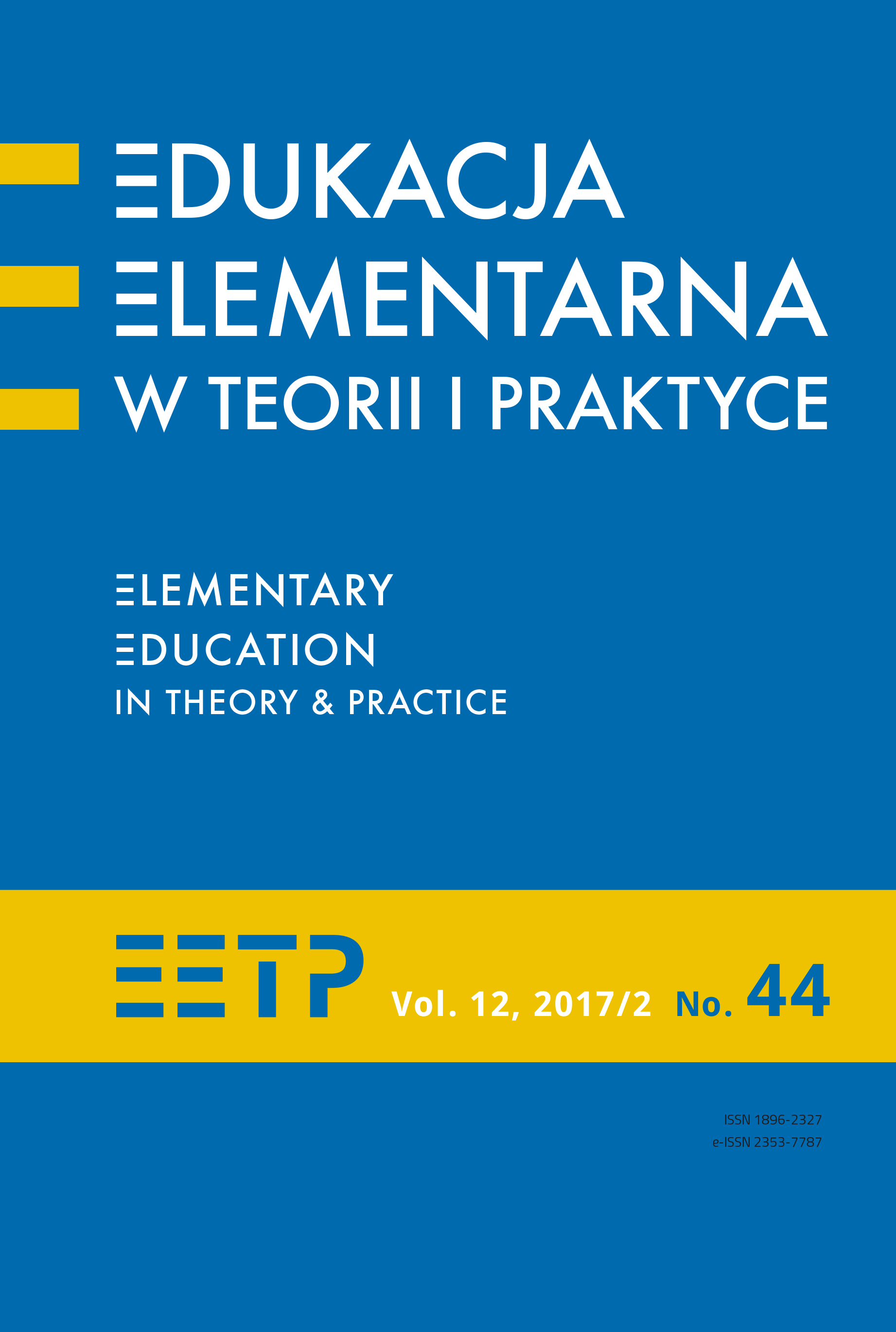Żywotność rekonstrukcji elementów folkloru Kaszub w edukacji wczesnoszkolnej
Abstrakt
Różnorodność etniczna i kulturowa zajmuje wiele miejsca we współczesnym dyskursie publicznym. W Polsce problem wielokulturowości dotyczy przede wszystkim mniejszości etnicznych, które od pokoleń rozwijały własną tożsamość, utrzymując swoiste dziedzictwo kulturowe. Dotyczy to między innymi społeczności kaszubskiej. Kaszubi czują się w pełni Polakami, dlatego funkcjonują w sytuacji dwukulturowości i dwujęzyczności. W artykule przedstawiono wyniki badań, których celem było poznanie wiedzy i umiejętności rekonstrukcji elementów folkloru przez dzieci na Kaszubach w obszarze muzyki, obrzędowości i języka kaszubskiego oraz poznanie opinii członków rodziny kaszubskiej i nauczycieli języka kaszubskiego na temat kaszubskiej działalności edukacyjnej. W postępowaniu badawczym wykorzystano test sprawdzający dla uczniów klas trzecich szkoły podstawowej, wywiad z nauczycielką języka kaszubskiego oraz wywiad z członkami rodziny kaszubskiej. W wyniku analizy zebranego materiału badawczego stwierdzono, że badani prezentują dobry poziom wiedzy w wyznaczonych zakresach. Najlepsze wyniki testu uzyskali uczniowie z obszaru obrzędowości. Wiele interesujących kwestii dotyczących folkloru kaszubskiego wniosły wywiady z rodziną kaszubską. Respondentki, dobrze znając kulturę i język kaszubski, uczyniły wiele elementów muzyki, obrzędowości i literatury nieodłącznym elementem życia codziennego. Wynika z tego, że rodziny kaszubskie stanowią ważne źródło zachowania kultury i jej trwania. Jest to istotny sygnał dla szkoły, aby w procesie edukacyjnym uczestniczyli rodzice w imię wspólnego działania na rzecz podtrzymywania tożsamości kulturowej i przekazywania wartości kultury kaszubskiej młodym pokoleniom.
Bibliografia
Bielawski L. (red.), Polska pieśń i muzyka ludowa. Źródła i materiały, Tom 2, Kaszuby, PAN, Warszawa 1997.
Burszta J., Folklor, [w:] Słownik etnologiczny. Terminy ogólne, red. Z. Staszczak, PWN Warszawa – Poznań 1987.
Drejer F., Wychowanie dzieci do kultury regionalnej w edukacji wczesnoszkolnej (teoria i praktyka), KPSW, Jelenia Góra, 2013.
Drzeżdżon J., O edukacji dziecka na ziemi kaszubskiej, [w:] Jana Drzeżdżona niedokończony tryptyk społeczny a edukacja regionalna, red. K. Kossak, Wyd. Uniwersytetu Gdańskiego, Gdańsk 1995.
Frankowska W., Muzyka Kaszub. Materiały encyklopedyczne, Oficyna CZEC, Gdańsk 2015.
Gulgowski I., Kaszubi, Orbis, Kraków 1924.
Jabłoński A., Kaszubi. Wspólnota narodowa, Region, Gdynia 2013.
Jałowiecki B., Szczepański M., Rozwój lokalny i regionalny w perspektywie socjologicznej. Podręcznik akademicki, Śląskie Wydawnictwa Naukowe, Tychy 2002.
Karłowicz J., Gwara kaszubska, odbitka z tomu XII „Wisły”, Warszawa 1898.
Mistarz R., Wszystko co chcielibyście wiedzieć o organizacji nauczania języka kaszubskiego oraz własnej historii i kultury, CEN, Gdańsk 2014.
Mistarz R., Kalendarium wydarzeń znaczących dla edukacji kaszubskiej, „Edukacja Pomorska” 64/65(2014)15/16.
Perszon J., Kultura ludowa Kaszubów w procesie przemian, [w:] Badania kaszuboznawcze w XX wieku, red. J. Borzyszkowski, C. Obracht-Prondzyński, Instytut Kaszubski, Gdańsk 2001.
Szefka P., Narzędzia i instrumenty muzyczne z Kaszub i Kociewia, Muzeum Piśmiennictwa i Muzyki Kaszubsko-Pomorskiej, Zrzeszenie Kaszubsko-Pomorskie, Oddział w Wejherowie, Wejherowo 1982.
Żerańska-Kominek S., Muzyka w kulturze. Wprowadzenie do etnomuzykologii, Wydawnictwa Uniwersytetu Warszawskiego, Warszawa 1995.
Dz.U. 2005 nr 17 poz. 141. Ustawa z dnia 6 stycznia 2005 r. o mniejszościach narodowych i etnicznych oraz o języku regionalnym.
http://mniejszosci.narodowe.mac.gov.pl [dostęp: 23.10.2015].
http://muzeumliteratury.pl/male%CC%88nci-ilustracje-do-legendkaszubskich/ [dostęp: 18.10.2015].
http://ug.edu.pl/20479/etnofilologia_kaszubska [dostęp: 17.10.2015].
http://www.nakaszuby.pl/Kaszuby/haft_kaszubski.html [dostęp: 23.10.2015].
Copyright (c) 2017 Edukacja Elementarna w Teorii i Praktyce

Utwór dostępny jest na licencji Creative Commons Uznanie autorstwa – Bez utworów zależnych 4.0 Międzynarodowe.
1. Autor zgłaszając swój artykuł oświadcza, że jest Autorem artykułu (zwanego dalej Utworem) i:
- przysługują mu wyłączne i nieograniczone prawa autorskie do Utworu,
- jest uprawniony/a do rozporządzania prawami autorskimi do Utworu.
Oświadcza, że nie narusza praw autorskich osób trzecich i praw prawnych.
Oświadcza, że nie występuje żaden konflikt interesów.
2. Udziela Uniwersytetowi Ignatianum w Krakowie nieodpłatnej, niewyłącznej, nieograniczonej terytorialnie licencji do korzystania z Utworu na następujących polach eksploatacji:
- utrwalania utworu w formie papierowej, a także na nośniku cyfrowym lub magnetycznym;
- zwielokrotnienia utworu dowolną techniką, bez ograniczenia ilości wydań i liczby egzemplarzy;
- rozpowszechniania utworu i jego zwielokrotnionych egzemplarzy na jakimkolwiek nośniku, w tym wprowadzenia do obrotu, sprzedaży, użyczenia, najmu;
- wprowadzenia utworu do pamięci komputera;
- rozpowszechniania utworu w sieciach informatycznych, w tym w sieci Internet;
- publicznego wykonania, wystawienia, wyświetlenia, odtworzenia oraz nadawania i reemitowania, a także publicznego udostępniania utworu w taki sposób, aby każdy mógł mieć do niego dostęp w miejscu i czasie przez siebie wybranym;
- w zakresie praw zależnych do Utworu, obejmujących w szczególności prawo do dokonania koniecznych zmian w Utworze, wynikających z opracowania redakcyjnego i metodycznego, a także do dokonania tłumaczenia Utworu na języki obce.
Udzielenie licencji następuje z chwilą przekazania Utworu na rzecz Uniwersytetowi Ignatianum w Krakowie. Uniwersytet Ignatianum w Krakowie jest uprawniony do udzielania dalszych sublicencji do Utworu, w zakresie udzielonego prawa. Licencja jest ograniczona czasowo i zostaje udzielona na okres 15 lat, licząc od daty jej udzielenia.
Wyraża się zgodę i zachęca autorów do publikacji ich tekstu w Internecie (np. w repozytorium instytucji lub na jej stronie internetowej) przed lub podczas procesu składania tekstu jako, że może to prowadzić do korzystnych wymian oraz wcześniejszego i większego cytowania opublikowanego tekstu (Patrz The Effect of Open Access). Zalecamy wykorzystanie dowolnego portalu stowarzyszeń badawczych z niżej wymienionych:




